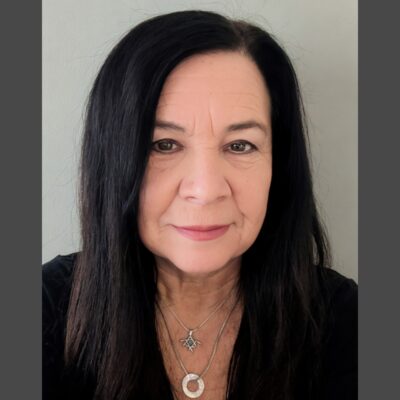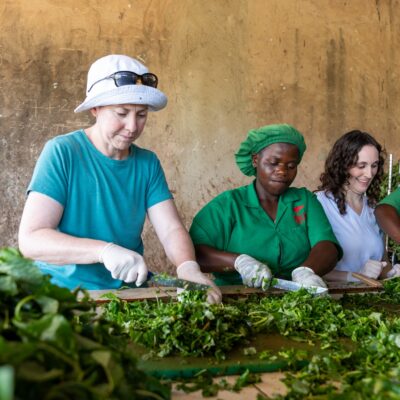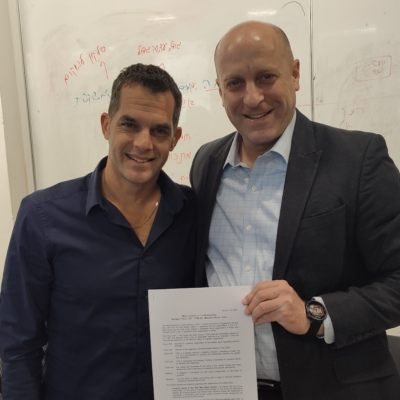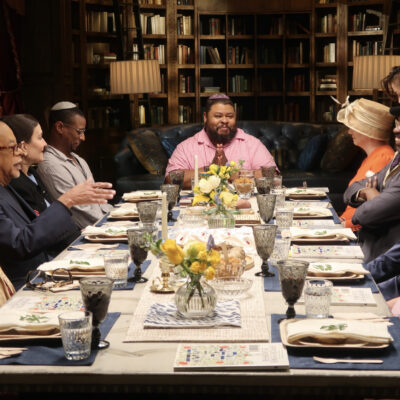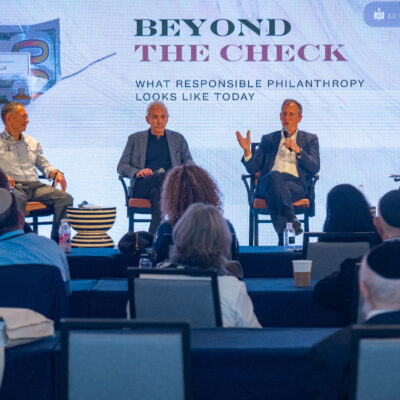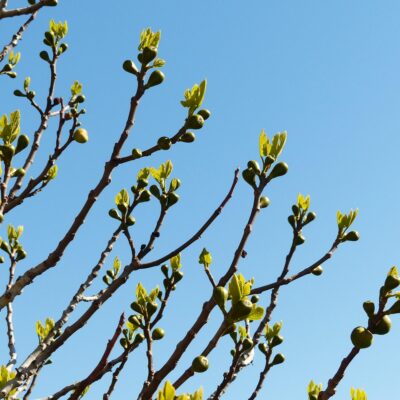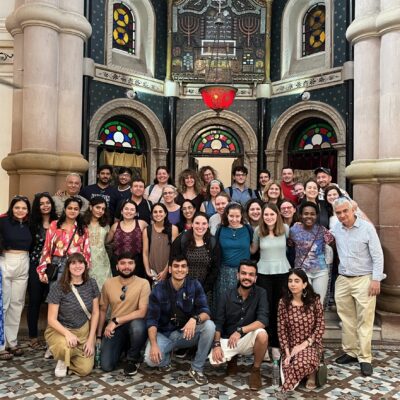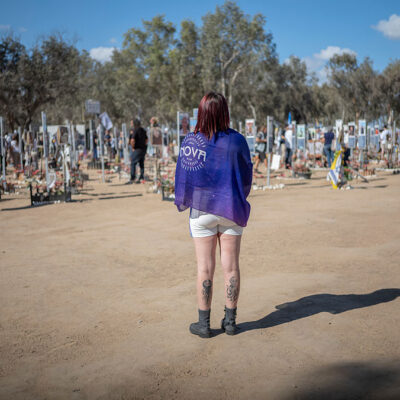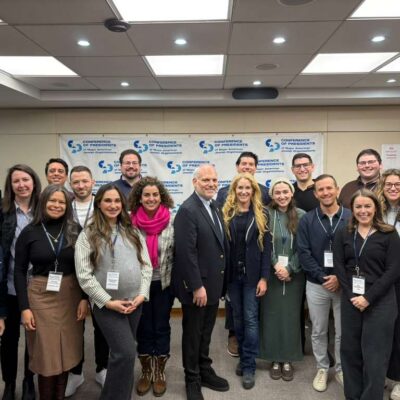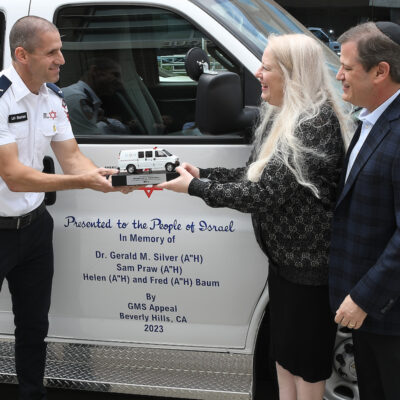ON THE SCENE
AJU announces $4.5 million gift, honors scholars at ‘Together We Thrive’ brunch and concert gala
The donation will go to the school's education program, which will be renamed in honor of the donors, Harold and Amy Masor

Jodye Alcon Photography/American Jewish University.
From left, American Jewish University board chair Harold Masor, AJU professor Michael Berenbaum, AJU professor Rabbi Elliot Dorff and AJU President Jeffrey Herbst stand together during the university's annual gala in Los Angeles on June 2, 2024.
American Jewish University board chair, Harold Masor, and his wife, Amy, will donate $4.5 million to the institution, the school announced at a gala event on Sunday.
During the event, AJU President Jeffrey Herbst said the university’s School for Jewish Education and Leadership — which offers educational training from early childhood through 12th grade — would be renamed the Masor School of Jewish Education in honor of the donors. Herbst called the move “extremely appropriate given [the Masors’] lifelong dedication to Jewish education and Jewish continuity.”
“Now generations of teachers will be able to benefit from Harold and Amy’s generosity and to serve and inspire Jewish children and their families. This is especially important since we know that the decision to affiliate with the synagogue is directly tied in many cases to early childhood Jewish education,” Herbst told the crowd.
At the fundraiser brunch and concert, titled “Together We Thrive,” the university also honored two longtime scholars, Michael Berenbaum, a professor of Jewish studies and noted Holocaust scholar, and Rabbi Elliot Dorff, the rector and philosophy professor and expert in Jewish law. The event was held on the Sunny & Isadore Familian Campus, a location that AJU sold to the Milken Community School earlier this year.
The late morning event, which featured brunch staples like bagels, waffles and coffee, was hosted by comedian Elon Gold. Violinist Niv Ashkenazi and bassoonist Leah Kohn performed, and there was a special presentation of U.S. flags from Rep. Brad Sherman (D-CA) to honorees Berenbaum and Dorff.
Gold — wearing special-issue white sneakers bedecked with Stars of David — played the room, offering comedic commentary about the difference between American and Israeli Jews, as well as the challenge of reaching students on campus with messaging that negates the rhetoric about Israelis as colonizers. “The only place Jews ever colonized was the Catskills. My zayde, he was a bungalow colonizer,” Gold quipped.
Before the event, AJU’s board chair, Harold Masor, told eJP that the university had been occupying less than 10% of the 220,000-230,000-square- foot Familian campus. After the COVID-19 pandemic accelerated the school’s fiscal challenges, he said, “as beautiful and iconic as this space is, it was a [financial] burden.” Three years ago, the board decided to sell the campus; the sale to Milken was completed in February 2024 .
“Our whole emphasis has been to try to meet the Jewish community where it is,” Herbst told eJP before the event’s formal program began. “Part of the rationale for the sale was that demanding that people come to Bel Air wasn’t working.” Herbst explained that rabbinical school classes were being run from a building in the Pico-Robertson area, and that AJU is retaining the 2,700-acre Brandeis Bardin campus in Simi Valley, the site of Camp Alonim and other programs.
After the event, a press representative told eJP that the Masors were extending their philanthropic support with an additional $550,000 donation earmarked for enhancing Camp Alonim.
“As a result of the sale, we’ve eliminated all of our debt and obtained many more millions of dollars of funds to put into our endowment. And so we’re sitting here now in a very strong financial position,” Masor told eJP, adding that the next step is to “really hone in on what our future is going to look like.”
During the conversation with eJP, Masor said that the school of education — the one that will bear his family’s name moving forward — “is going gangbusters,” citing program growth from 18 students six years ago to 127 in the fall of 2024, including those in the early childhood education program, a master’s program and a completion program for undergraduate students. The school also has a program that gives college credit to high schoolers across the U.S.; this year’s focus is on a program training high school seniors about Israel, “so that when they go to college campuses, they’re armed in the appropriate way,” Masor said.
“America in general is becoming more fragmented, less affiliated with traditional institutions,” Herbst told eJP, adding that the university is following this trend by instituting the “Jewish Learning Experience”: signing agreements with synagogues nationwide where instructors will teach AJU courses for credit. “It’s not that being land-bound prevented us from doing it in the past, but now that we don’t have the weight of the cost [of the physical space], we can go out and be more entrepreneurial,” he said.
Berenbaum, a former president and CEO of the Survivors of the Shoah Visual History Foundation, and Dorff, who has taught at AJU since 1971 and has written 15 books and edited or co-edited 14 more on Jewish thought, law and ethics — as well as more than 200 articles on those topics — introduced each other and presented each other with the same framed plaque.
Introducing Dorff at the event, Berenbaum noted that they were both getting the same commemorative plaque.
“Not only will this plaque be hanging in our home, but it will be hanging in each other’s homes. Because this is a friendship. This is a comradeship. This is an ongoing dialogue between scholars, friends, rabbis and teachers,” Berenbaum said. “We continue this dialogue every Shabbat. Elliot comes to shul to speak to God. I come to shul to speak to Elliot.”
Introducing Berenbaum, Dorff joked that since Berenbaum had edited Encyclopedia Judaica, Berenbaum literally has encyclopedic knowledge.
“But it’s not only the quantity of what he does; it’s the quality of what he does. He puts historical events in perspective and gives you a sense of why they are important and what meaning they have for us now. And he’s been really creative in discerning the ethical norms that we should learn from the atrocity that was the Holocaust,” Dorff said.
Masor told eJP that in addition to their achievements, the honorees are “very warm and extremely humble,” and that “when you meet them, you would never know the kind of giants that they are in their fields. I think that speaks volumes to the kind of people that they are.”

 Add EJP on Google
Add EJP on Google



